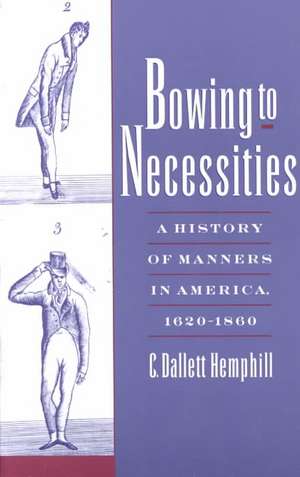Bowing to Necessities: A History of Manners in America, 1620-1860
Autor C. Dallett Hemphillen Limba Engleză Paperback – 16 mai 2002
| Toate formatele și edițiile | Preț | Express |
|---|---|---|
| Paperback (1) | 394.31 lei 32-37 zile | |
| Oxford University Press – 16 mai 2002 | 394.31 lei 32-37 zile | |
| Hardback (1) | 863.34 lei 32-37 zile | |
| Oxford University Press – 30 sep 1999 | 863.34 lei 32-37 zile |
Preț: 394.31 lei
Preț vechi: 484.87 lei
-19% Nou
Puncte Express: 591
Preț estimativ în valută:
75.45€ • 80.68$ • 62.91£
75.45€ • 80.68$ • 62.91£
Carte tipărită la comandă
Livrare economică 07-12 aprilie
Preluare comenzi: 021 569.72.76
Specificații
ISBN-13: 9780195154085
ISBN-10: 0195154088
Pagini: 320
Dimensiuni: 152 x 234 x 20 mm
Greutate: 0.46 kg
Ediția:Revised
Editura: Oxford University Press
Colecția OUP USA
Locul publicării:New York, United States
ISBN-10: 0195154088
Pagini: 320
Dimensiuni: 152 x 234 x 20 mm
Greutate: 0.46 kg
Ediția:Revised
Editura: Oxford University Press
Colecția OUP USA
Locul publicării:New York, United States
Recenzii
Hemphill's approach to [her] subject is refreshing. She brings serious understanding and a subtlety of mind to a body of knowledge that initially appears infinitely exhausting....Manners, as we commonly know, manage conflicts, contradictions, and hostility between people in the vagaries of everyday life. In the larger patterns of historical time, Hemphill argues that conduct books served to reflect relationships of power, class, gender, and age by means of which cultures performed serious work. Before 1740, manners reinforced inequality in a deferential, hierarchic structure. After, until the middle of the nineteenth century, they served as form and function for a 'rising' middle class that was realizing the possibilities of revolution through claims to republican and democratic values, albeit controversial. Hemphill succeeds in developing a one-dimensional source into a complex, shrewd story.
Manners have been receiving growing scholarly attention of late, in part perhaps because of the uncertainties about contemporary civilities. In this striking new contribution, C. Dallett Hemphill provides important new insights about the origins of American manners and about the role of changing etiquette standards in forming social class and gender definitions. There are provocative implications in this careful yet imaginative inquiry for topics as wide-ranging as childhood and humor.
Make no mistake: this marvelous book is much more than a narrow history of manners in early America. It is an expansive and brilliant history of early America in manners. C. Dallett Hemphill has read more etiquette manuals and conduct books than anyone else ever has, and she has read them more vivifyingly besides. She has tantalizing and transformative things to say about patriarchy and privacy, about body-control and the emergence of the middle class, about mastery and self-mastery, and, above all, about the changing muddles we have made of equality and inequality in the tangled relations of men and women and of the rich and the poor. She says these things with an authority and an easy grace that announce the appearance of a new star in the American historical firmament.
An impressive social history... Hemphill makes a convincing argument that manners...can tell a weighty historical story...Hemphill's account rightly addresses gender hierarchies, but it also pays close and comparative attention to those of rank and age, to produce a highly systematic and nuanced account of American social relations before the war.
[Hemphill] has written a beautifully lucid, engaging, and thorough study that will be valuable to all social and cultural historians of the first long "half" of American history and to our students.
Manners have been receiving growing scholarly attention of late, in part perhaps because of the uncertainties about contemporary civilities. In this striking new contribution, C. Dallett Hemphill provides important new insights about the origins of American manners and about the role of changing etiquette standards in forming social class and gender definitions. There are provocative implications in this careful yet imaginative inquiry for topics as wide-ranging as childhood and humor.
Make no mistake: this marvelous book is much more than a narrow history of manners in early America. It is an expansive and brilliant history of early America in manners. C. Dallett Hemphill has read more etiquette manuals and conduct books than anyone else ever has, and she has read them more vivifyingly besides. She has tantalizing and transformative things to say about patriarchy and privacy, about body-control and the emergence of the middle class, about mastery and self-mastery, and, above all, about the changing muddles we have made of equality and inequality in the tangled relations of men and women and of the rich and the poor. She says these things with an authority and an easy grace that announce the appearance of a new star in the American historical firmament.
An impressive social history... Hemphill makes a convincing argument that manners...can tell a weighty historical story...Hemphill's account rightly addresses gender hierarchies, but it also pays close and comparative attention to those of rank and age, to produce a highly systematic and nuanced account of American social relations before the war.
[Hemphill] has written a beautifully lucid, engaging, and thorough study that will be valuable to all social and cultural historians of the first long "half" of American history and to our students.
Notă biografică
ABOUT THE AUTHORC. Dallett Hemphill is Professor of History at Ursinus College in Pennsylvania.














